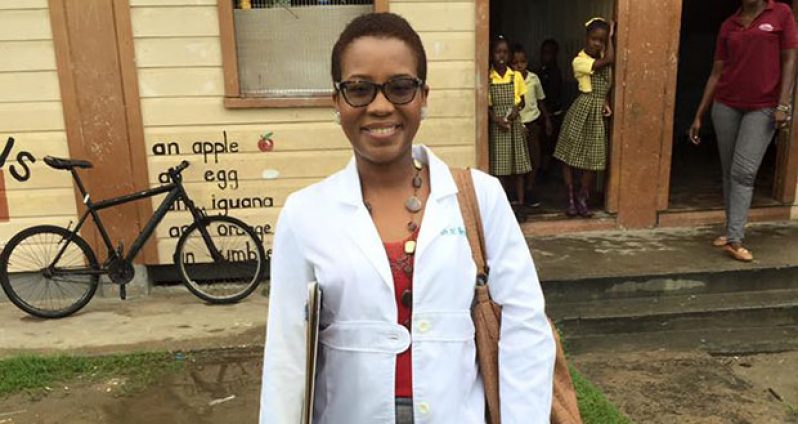By Telesha Ramnarine
DOCTOR-in-charge of the Public Health Skin Clinic, based in the Palms Geriatric Home on Brickdam, Heather Morris-Wilson, is currently visiting primary and secondary schools, in an effort to create awareness of Hansen’s disease in Guyana.The disease, also known as leprosy, is a chronic infection caused by the bacterium Mycobacterium leprae and Mycobacterium lepromatosis. It takes its name from the Latin word Lepra, which means “scaly”, while the term “Hansen’s Disease” is named after the physician Gerhard Armauer Hansen.
Although Guyana sees a small number of cases each year, Dr Wilson believes that if care is not exercised, staff expertise can become low and thus diagnosing will become very hard.
In targeting the young population, Dr Wilson said she and Dr Nikita Mc Kenzie, also from the Skin Clinic, have decided to visit the schools to talk about the disease and what to look for in determining if an individual has it.
The intention of the doctors is not only to raise awareness, but to stimulate the students to do their own research on the disease. They are targeting five primary schools, Grades 5 and 6, and five primary schools, Grades 8 and 9.
The primary school students are being asked to use their artistic skills in creating a poster after their interaction with the doctors.
They will be judged by May month-end and the winners (1st, 2nd and 3rd) will be given prizes, compliments of Austin’s Book Store.
After seeking permission from the Ministry of Education, the two doctors have so far visited the Paradise Primary, Cummings Lodge Secondary and Annandale Secondary Schools.
They also visited President’s College, Plaisance Primary, Hope Secondary, Vryheid’s Lust Primary, and Gibson Primary. On May 19, the doctors will head to Lusignan Primary and Mon Repos Primary.
Meanwhile, Dr Wilson, in an interview, had explained to this newspaper that Hansen’s disease is one of poverty. Hence, persons exposed to poor housing, bed bugs, overcrowding, poor sanitation and water are more susceptible to the disease.
“It tends to spread in these conditions. So you find a lot of persons in the slums would get it.”
IMPORTED CASES
Importantly, she noted that Guyana sees ‘imported’ cases from time to time because neighbouring Brazil has the largest amount of cases per year.
According to her, one of the first clinical signs that indicate leprosy is a noticeable rash on the skin, where there is loss of feeling or sensation. The rash can develop on any part of the body, depending on the type of leprosy.
In addition to skin rashes, there can also be a tingling sensation in the hands and/ or feet, and a burning sensation of the skin – because the disease affects the nerves.
Furthermore, there is loss of feeling, no sweating and no hair growth in the affected area. “We call it a numb spot disease,” Dr Wilson said.
A cotton wool test for sensation would then be in order. It is referred to as the ‘pinch and touch’ test. On most occasions, when it is indeed leprosy that the person has, he will not be able to differentiate a pinch from a touch.
Some persons who suffer with the disease also have to endure weakness, paralysis in the hands and feet, and affected muscles of the eyes.
“Leprosy treated late can cause severe eye complications and lead to blindness because of weakness of the eyelids and the muscles of the eye. So we would need to do a skin smear test where we just use a lymph fluid. We don’t need blood,” Dr Wilson explained.
Dr Wilson has had patients who confessed to her that they opted to consult a witch doctor for help because they believe leprosy is a curse from God.
However, Dr Wilson said: “Everyone is susceptible to leprosy. You develop leprosy depending on your body’s immunity. So you have to try to build your immune system; exercise, eat your proper meals. Just be healthy. There is no way to really prevent it. You can obtain it in indirect ways.”
Transmission can occur by someone who has a lot of leprosy in their body and if treatment is not started, this individual can cause the bacteria to spread.
“If it is discovered late, it can cause deformity because of the nerve damage.”
It has been found that leprosy patients are often shunned, even by family members, because the disease comes with visible deformities. And hence, such individuals feel discriminated against.


.jpg)











